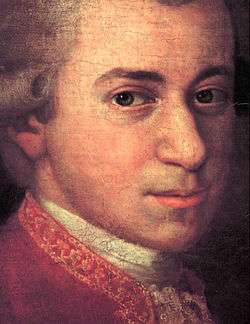Vesperae solennes de Dominica (Mozart)
Vesperae solennes de Dominica, K. 321, is a sacred work composed in 1779 by Wolfgang Amadeus Mozart. It is scored for SATB soloists, SATB choir, violin I, violin II, 2 trumpets, 3 trombones colla parte, 2 timpani, and basso continuo (bassoon and organ).
It was composed in Salzburg at the request of the Archbishop Colloredo for liturgical use in the city's cathedral. The title "de Dominica" signifies its use in Sunday services.[1]
The setting is divided into six movements, including five psalms and a setting of the Magnificat. A setting of the Minor Doxology (Gloria Patri) concludes all movements, each recapitulating the opening theme. The first three psalms are scored in a vigorous, exuberant manner, contrasting with the strict counterpoint of the a cappella Laudate pueri. The Laudate Dominum is set as an extended aria for the soprano soloist with obbligato organ, while the Magnificat opens with a majestic, moderate tempo, only to return to the bolder tempo of the first three psalms.[2]
- Dixit Allegro vivace, C major, common time
- Confitebor Allegro, E minor, 3/4
- Beatus vir Allegro, B-flat major, common time
- Laudate pueri F major, cut common time
- Laudate Dominum Allegro, A major, 3/4
- Magnificat Adagio maestoso, C major, common time
- —"Et exultavit..." Allegro, C major, common time
In 1780, Mozart composed another setting of the Vespers, the Vesperae solennes de confessore, which shares many musical similarities with this work.
Media
.jpg)
 |
Vesperae de Dominica
2nd movement
Confitebor (Psalm 110) (5:59 minutes, 6 MB) 3rd movement
Beatus vir (Psalm 111) (4:24 minutes, 5 MB) 4th movement
Laudate pueri (Psalm 112) (3:59 minutes, 4 MB) |
| Problems playing these files? See media help. | |
See also
References
- ↑ Robert Gutnam (2011). Mozart. Retrieved 21 February 2013.
- ↑ Alfred Einstein, Arthur Mendel (1945). Mozart: His Character, His Work. Retrieved 21 February 2013.
External links
- Vesperae solennes de Dominica KV 321: Score and critical report (German) in the Neue Mozart-Ausgabe
- Free scores of Vesperae solennes de Dominica in the Choral Public Domain Library (ChoralWiki)
- Vesperae solennes de Dominica: Scores at the International Music Score Library Project
